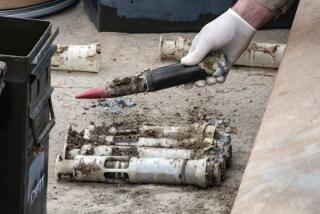Stockpiles of Horror
British officials report that Soviet Foreign Minister Eduard A. Shevardnadze during his recent visit to London showed “constructive interest” in a British proposal aimed at bringing Moscow and Washington together on a global chemical-arms ban. More than 10 days have passed, however, and the Soviet Union still has not made a formal response.
During the long-running 40-nation disarmament conference in Geneva, both America and the Soviet Union have professed willingness to join in a ban on the production or storage of chemical weapons. But the question of verification has proved to be a formidable stumbling block.
The United States maintains a large, though deteriorating, arsenal of chemical arms, but unilaterally halted the production of such weapons 17 years ago. Nobody seriously suggests that the Soviet Union followed suit. As a British spokesman told the Geneva conference a few days ago, the Soviet chemical-warfare stockpile “probably approaches in total all chemical weapons produced by all other nations since chemical warfare first began.”
The Reagan Administration is planning to resume production of chemical arms in early 1988, the allies and a reluctant Congress willing, unless a global ban containing satisfactory provision for verification of Soviet compliance can be negotiated before then.
Alarm over chemical and biological weapons is not limited to the Soviet stockpile. In a sense, chemical weapons are the poor man’s A-bomb. Iraq has used them against Iran, causing perhaps 10,000 casualties so far, and Iran may be close to producing chemical arms as well. As many as20 countries either possess such weapons or are actively considering their acquisition.
Common sense suggests that the major powers have a shared interest in curbing the spread of chemical weapons, just as they have an interest in heading off the proliferation of nuclear weapons. And, indeed, Washington and Moscow have both declared this to be the case. Earlier this month Viktor Karpov, a ranking Soviet arms-control official, expressed optimism that a chemical-weapons ban can be signed by the end of this year. Unfortunately, there isn’t much evidence that this will happen.
Just two weeks ago the United States released to the Geneva conference previously classified details on its chemical-warfare arsenal, which consists of weapons manufactured and stored before the 1969 halt in production. As U.S. negotiator Thomas Barthelmy observed, the Soviets could encourage an atmosphere of confidence by making the same kind of disclosure. But the Soviet negotiator rejected the challenge, thereby reenforcing Washington’s conviction that a chemical ban must include provisions to guarantee that the Soviets actually stop production of chemical arms and destroy their existing arsenal.
A draft treaty submitted by Washington in 1984 called for the right to demand inspection of suspected production or storage sites on 24 hours’ notice. Moscow declined, calling the U.S. proposal a subterfuge for spying.
Under the British compromise proposal, a party to the treaty could refuse a demand for inspection “in very limited circumstances.” But a challenged state would be obliged to present alternative proof of innocence within seven days--or stand in clear violation of the treaty. That would free other signatories from their own treaty obligations.
Surely the United States, after due consideration, will accept the British compromise proposal in principle, if not in every detail. The Soviets would be well advised to do so, too. As the British spokesman at Geneva warned, unless an enforceable ban can be negotiated the West may be forced, despite its repugnance at chemical arms,to take concrete measures to counter the Soviet threat in these weapons. A global ban makes better sense for everybody concerned.
More to Read
Sign up for Essential California
The most important California stories and recommendations in your inbox every morning.
You may occasionally receive promotional content from the Los Angeles Times.










